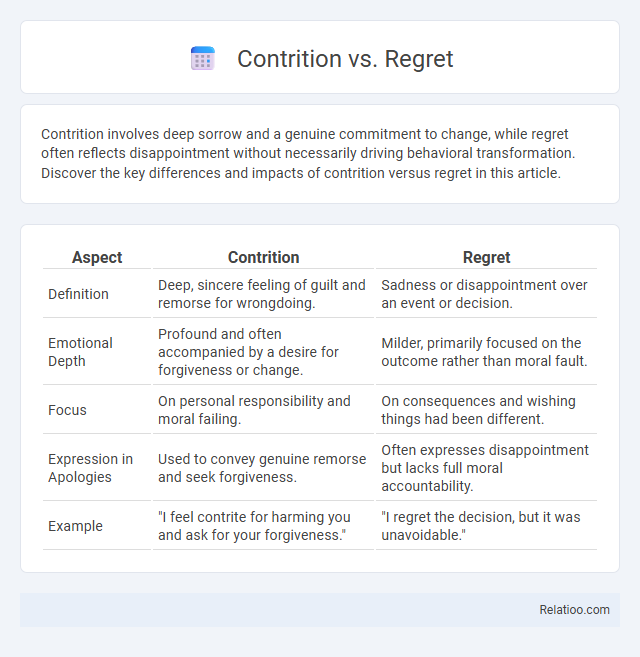Contrition involves deep sorrow and a genuine commitment to change, while regret often reflects disappointment without necessarily driving behavioral transformation. Discover the key differences and impacts of contrition versus regret in this article.
Table of Comparison
| Aspect | Contrition | Regret |
|---|---|---|
| Definition | Deep, sincere feeling of guilt and remorse for wrongdoing. | Sadness or disappointment over an event or decision. |
| Emotional Depth | Profound and often accompanied by a desire for forgiveness or change. | Milder, primarily focused on the outcome rather than moral fault. |
| Focus | On personal responsibility and moral failing. | On consequences and wishing things had been different. |
| Expression in Apologies | Used to convey genuine remorse and seek forgiveness. | Often expresses disappointment but lacks full moral accountability. |
| Example | "I feel contrite for harming you and ask for your forgiveness." | "I regret the decision, but it was unavoidable." |
Understanding Contrition: A Deep Dive
Contrition is a profound feeling of sincere remorse and repentance for wrongdoing, distinguished by a genuine desire to atone and change behavior, unlike regret which often reflects sorrow without transformative intent. Understanding contrition involves recognizing its moral and emotional depth, as it motivates corrective actions and reconciliation, making it central in ethical and religious contexts. This deep dive into contrition emphasizes its role in personal growth and accountability, highlighting its distinction from mere regret or simple remorse.
Regret Defined: Surface-Level Reflection
Regret involves a surface-level reflection on past actions, where you recognize that a different choice might have led to a better outcome but without a profound emotional or moral engagement. Contrition goes deeper, encompassing sincere remorse and a commitment to make amends for the wrongdoing. While regret may simply acknowledge mistakes, true contrition motivates behavioral change and personal growth.
Contrition vs Regret: Key Semantic Differences
Contrition involves a deep, sincere remorse for wrongdoing, often linked to a moral or spiritual recognition of guilt, while regret primarily reflects sorrow or disappointment over an outcome without necessarily implying moral responsibility. Contrition usually motivates corrective actions and reconciliation, emphasizing accountability and transformation, whereas regret may simply express feelings of sadness or dissatisfaction. Understanding these nuances is crucial in contexts such as psychology, law, and theology, where the depth of emotional response and intention can influence judgments and personal growth.
Emotional Depth: Contrition Compared to Regret
Contrition involves a profound emotional depth characterized by sincere remorse and a genuine desire to make amends, often influencing moral and spiritual growth. Regret centers on feelings of disappointment or sorrow over past actions but lacks the intense moral self-reproach found in contrition. Contrition engages deeper emotional and ethical dimensions beyond the surface-level sadness typically associated with regret.
The Role of Accountability in Contrition
Contrition involves a deep sense of accountability, recognizing the harm caused by your actions and genuinely committing to make amends. Regret is often a feeling of sadness or disappointment without necessarily accepting responsibility or prompting change. Your ability to embrace true contrition hinges on owning your mistakes and actively seeking forgiveness and improvement.
Regret and Personal Growth
Regret involves recognizing past mistakes and feeling sorrow for actions that may have caused harm, serving as a catalyst for personal growth by encouraging reflection and change. Contrition goes beyond regret by encompassing sincere remorse and a genuine desire to make amends, often tied to moral or spiritual accountability. You can harness regret as a powerful tool for self-improvement, turning negative experiences into opportunities for learning and transformation.
Psychological Impacts: Contrition vs Regret
Contrition involves sincere remorse and a desire to make amends, leading to positive psychological effects such as reduced guilt and improved emotional well-being. Regret reflects a sense of disappointment or sorrow without the deep acknowledgment of wrongdoing inherent in contrition, which may result in lingering negative emotions and unresolved internal conflict. Understanding the distinction between contrition and regret can help you foster healthier emotional processing and personal growth.
Contrition in Religious and Moral Contexts
Contrition in religious and moral contexts signifies a deep, sincere sorrow for wrongdoing, often accompanied by a desire for repentance and moral improvement, distinguishing it from regret, which may lack this transformative intent. While regret involves feeling bad about an action's consequences, contrition emphasizes an ethical acknowledgment of sin or fault, integral to many faith traditions such as Christianity and Judaism, where it is essential for forgiveness. Contrition is thus a foundational concept in spiritual reconciliation, reinforcing personal accountability and fostering genuine moral change.
Everyday Scenarios: Contrition and Regret in Action
Contrition involves a deep, sincere remorse for wrongdoings that often leads to genuine efforts to make amends, while regret is a feeling of sadness or disappointment over a decision or outcome without necessarily implying moral responsibility. In everyday scenarios, contrition manifests when you apologize sincerely after hurting a friend, striving to rebuild trust, whereas regret appears when you wish you had chosen a different route but don't take further action. Understanding the distinction between contrition and regret helps you navigate emotional responses effectively and fosters healthier personal growth.
Transformation: Moving Beyond Regret to Contrition
Regret involves feeling sorrow for a past action's outcome, often accompanied by negative emotions but lacks a commitment to change, whereas contrition encompasses a deeper, sincere remorse that propels Your transformation toward moral and behavioral improvement. Contrition acts as a catalyst for genuine personal growth by integrating acknowledgment of wrongdoing with a proactive desire to make amends and avoid repeating mistakes. Moving beyond regret to contrition enables enduring change, fostering accountability and emotional healing through reflective self-awareness.

Infographic: Contrition vs Regret
 relatioo.com
relatioo.com